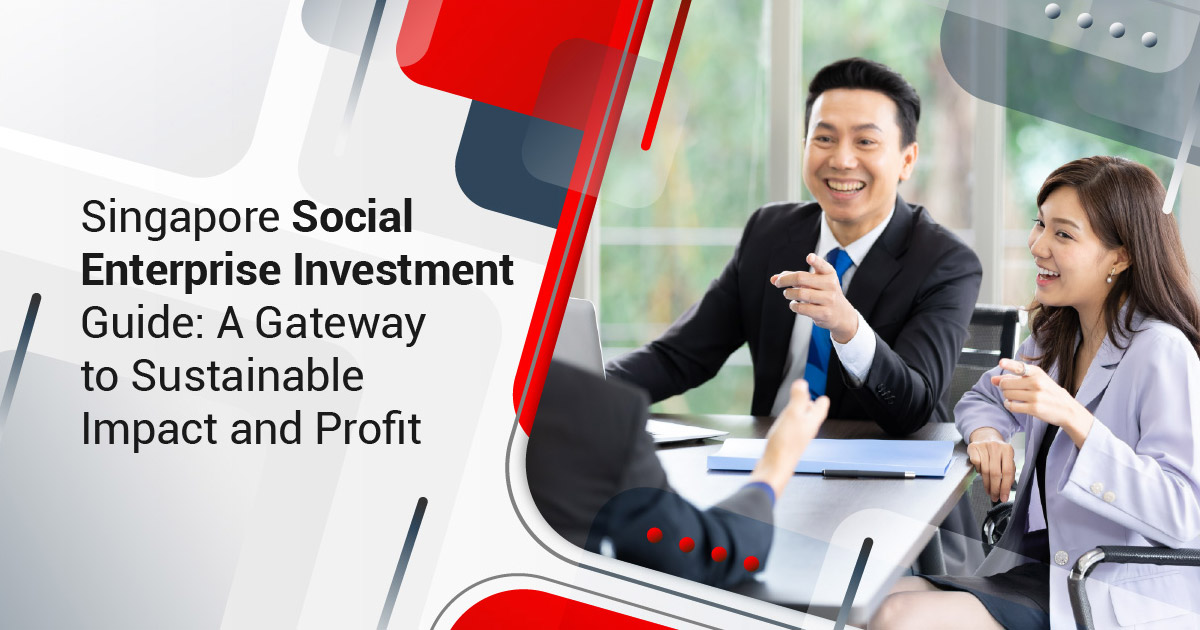Singapore has emerged as Southeast Asia’s leading hub for social enterprise development, attracting global investors who seek to combine financial returns with meaningful social impact. With over 2,600 active social enterprises and robust government support systems in place, the Lion City presents compelling opportunities for foreign investors looking to establish purpose-driven businesses in one of the world’s most business-friendly environments.
Key Takeaways
- Singapore hosts over 2,600 active social enterprises, backed by robust government and ecosystem support.
- Strong economic fundamentals and sustained growth – GDP projected at 1.5-2.5% in 2025 – create a favourable investment climate.
- Foreign investors enjoy attractive incentives with up to 50% corporate tax rebate (capped at S$40,000), 400% tax deduction on R&D, and no capital gains tax for qualifying investments.
- Simple incorporation process: Foreigners can set up a Private Limited Company remotely; professional firms such as InCorp provide end-to-end support.
- Strategic regional access: Singapore’s market connects easily to the entire ASEAN region, benefiting from stable policies and world-class infrastructure.
- Social enterprises focus on community challenges (e.g., employment for disadvantaged groups, elderly care, sustainability), with measurable positive impact.
- Joining raiSE offers further funding, training, and networking opportunities essential to scaling impact and business.
- Success depends on balancing social impact with financial sustainability, strong partnerships, and robust impact measurement systems.
Why Singapore is the Ideal Destination for Social Enterprise Investment
Singapore stands out as a premier destination for social enterprise investment, offering a resilient economy, rapid market growth, and robust government backing. This section highlights the nation’s strong economic performance, expanding digital market, and the comprehensive incentives and support available to investors aiming to create impact-driven businesses.
A Thriving Economic Landscape
Singapore’s economy demonstrated remarkable resilience in 2024, achieving a 4.4% growth rate despite global uncertainties. While growth is projected to moderate to 1.5-2.5% in 2025, the country’s economic fundamentals remain strong, supported by strategic government initiatives and continued foreign investment confidence. The nation attracted an impressive US$192 billion in Foreign Direct Investment in 2024, ranking third globally.
Singapore’s social commerce market is experiencing exponential growth, valued at US$4.9 billion in 2024 and projected to expand at a 12.6% CAGR through 2033, reaching approximately US$16.2 billion. This growth trajectory, combined with 5.4 million active social media users, creates fertile ground for innovative social enterprises that leverage digital platforms for community impact.
Government Support and Incentives
The Singapore government has implemented comprehensive support mechanisms specifically designed to nurture social enterprises. Key initiatives include:
Financial incentives:
- 50% Corporate Income Tax rebate for 2025, capped at S$40,000
- 400% tax deduction for R&D, intellectual property, training, and innovation expenditures
- 200% tax deduction on overseas expansion-related costs
- No capital gains tax for qualifying investments
Dedicated Support Infrastructure
The Singapore Centre for Social Enterprise (raiSE) serves as the ecosystem builder for social enterprises, established through cross-sector collaboration between government agencies and private organisations. raiSE provides access to exclusive funding opportunities, training programs, and networking events that can significantly accelerate business growth.
Funding Landscape for Social Enterprises
Singapore offers one of the world’s most comprehensive funding ecosystems for social enterprises, with multiple grant programmes specifically designed to support impact-driven businesses at various stages of development.
Related Read: Why Singapore? Key Expansion Benefits & Fund Raising Options | InCorp Global
VentureForGood (VFG) Grant
- Maximum funding: S$300,000
- Eligibility: Growth-stage social enterprises that are raiSE members
- Focus: Creating human-centered social impact, particularly employment for disadvantaged individuals
EnergiSE Grant
- Maximum funding: S$50,000
- Duration: 12 months of support
- Target: Pre-seed to early-stage startups committed to building solutions for underserved communities
DBS Foundation Social Enterprise Grant
- Maximum funding: S$250,000
- Additional benefits: Access to business partnerships and mentorship by DBS executives
- Focus: Social enterprises creating sustainable community impact
4ST Partnership Fund
- Funding range: S$50,000 to S$400,000
- Duration: Up to 3 years
- Eligibility: Social service agencies, social enterprises, and ground-up groups
The funding landscape extends beyond grants, with impact investors and angel investors increasingly interested in supporting social ventures. Singapore’s position as a global financial hub provides access to diverse capital sources, including crowdfunding platforms and collaborative partnerships.
Setting Up Your Social Enterprise in Singapore

Establishing a social enterprise in Singapore is streamlined and flexible, offering multiple legal structures to suit diverse business models and impact goals. This section outlines the registration process and essential requirements for foreign investors and highlights how professional service providers facilitate smooth company setup and ongoing compliance.
Legal Structures and Registration Process
Foreign investors can choose from several legal structures when establishing a social enterprise in Singapore:
Private Limited Company (Pte Ltd) – Most Popular
- Minimum requirements: 1-50 shareholders, at least one local resident director
- Share capital: As low as S$1 (no minimum requirement for most industries)
- Benefits: Limited liability, separate legal entity, access to government grants and tax exemptions
- Processing time: 1-2 working days with complete documentation
Related Read: How to Set Up a Singapore Private Limited Company: A Guide
Alternative structures:
- Charities: Income tax exemption on qualifying income
- Companies Limited by Guarantee: Suitable for non-profit oriented social enterprises
- Cooperatives: 100% prevalence rate as social enterprises according to research data
Key Requirements for Foreign Investors
Director requirements:
- At least one local resident director (Singapore Citizen, PR, or valid work pass holder)
- Directors must be at least 18 years old
- Foreign directors may serve with proper work authorisation
Incorporation process:
- Company name reservation: Check availability and reserve the name for 120 days
- Document preparation: Articles of incorporation, director, and shareholder details
- ACRA submission: File through BizFile+ portal
- Business profile issuance: Receive UEN and official documentation
- Post-incorporation setup: Open a business bank account, obtain necessary licenses
Professional Support Services
Leading corporate service providers like InCorp offer comprehensive incorporation services, including:
- Online company registration (100% digital process)
- Corporate secretary services
- Accounting and tax compliance
- Business banking arrangements
- Ongoing compliance support
Strategic Advantages for Foreign Investors

Singapore provides foreign investors with unrivaled regional access and operational advantages. This section explores how Singapore’s prime location enables easy expansion into ASEAN markets, highlights the nation’s extensive trade agreements, and showcases its skilled workforce, cutting-edge infrastructure, and transparent legal and regulatory framework.
Market Access and Regional Expansion
Singapore serves as the gateway to Southeast Asia, with its strategic location providing access to ASEAN markets comprising over 650 million consumers. The country’s extensive network of over 100 double taxation agreements and 25+ free trade deals creates tax-efficient structures for regional operations.
Talent and Infrastructure
Singapore’s highly skilled workforce and world-class infrastructure provide competitive advantages for social enterprises. The government’s focus on workforce upskilling and global talent attraction ensures access to qualified personnel for scaling operations.
Regulatory Environment
Singapore’s transparent legal system and efficient regulatory framework consistently rank among the world’s most business-friendly environments. The predictable policy landscape and strong intellectual property protection create a secure foundation for long-term investments.
Social Impact Focus Areas
Singapore’s social enterprises address diverse community challenges, creating opportunities across multiple sectors.
Priority social issues:
- Employment for persons with disabilities: Over 50% of social enterprises operate in work integration mode
- Elderly care and social isolation: Addressing Singapore’s aging population needs
- Mental health and addiction support: Growing focus on community wellness
- Environmental sustainability: Climate action and circular economy initiatives
- Education and skills development: Addressing inequality and capability building
Business models:
- Subsidised Services Model: Commercial rates for mainstream customers, subsidised services for disadvantaged clients
- Work Integration Model: Employment and training opportunities for marginalised communities
- Social Needs Model: Addressing community bonding, family relationships, and social cohesion
Investment Considerations and Success Factors
While Singapore’s ecosystem offers abundant opportunities, investors should be aware of unique market realities and proven strategies for success. This segment examines potential challenges and essential strategic approaches and demonstrates how effective impact measurement and business sustainability drive financial and social returns.
Market Dynamics
While Singapore offers significant opportunities, investors should consider certain challenges:
Market Limitations
- Small domestic market: Limited economies of scale compared to larger countries
- Competitive environment: High standards required for product and service quality
- Scaling considerations: Regional expansion is often necessary for substantial growth
Success Strategies
- Strong business model: Balance between social impact and financial sustainability
- Community engagement: Deep understanding of local social challenges
- Partnership development: Collaboration with NGOs, government agencies, and corporate partners
- Impact measurement: Robust systems for tracking and reporting social outcomes
ROI and Impact Measurement
Successful social enterprises in Singapore demonstrate measurable returns across multiple dimensions.
Financial Returns
- Sustainable revenue models with diversified income streams
- Access to patient capital and impact investment funds
- Tax advantages and government incentives reduce operational costs
Social Impact Metrics
- Lives impacted and communities served
- Employment creation for disadvantaged populations
- Environmental benefits and sustainability outcomes
- Capacity building for social organisations
Getting Started: Next Steps for Foreign Investors
Investing in a social enterprise in Singapore requires a well-structured and strategic approach. Here is a detailed roadmap for foreign investors to successfully enter and thrive in Singapore’s social enterprise ecosystem.
Phase 1: Market Research and Planning
- Identify target social issues: Begin by thoroughly researching Singapore’s priority social challenges, such as employment for persons with disabilities, elderly care, mental health, environmental sustainability, and education. Understanding these issues is crucial to align your enterprise’s mission with real community needs and government focus areas.
- Develop a business model: Craft a business model that balances social impact with financial sustainability. Your model should define how revenue will be generated – whether through selling products, services, or a hybrid subsidy approach – and how it contributes to resolving the identified social issues. Consider incorporating scalable and innovative approaches that leverage digital platforms or community partnerships.
- Assess funding requirements: Carefully estimate your capital needs based on operational costs, staffing, marketing, and impact initiatives. Explore diverse funding sources such as government grants (e.g., VentureForGood, EnergiSE), impact investors, and crowdfunding platforms. Early clarity on funding needs will shape your financial strategy and help secure relevant support programs.
Phase 2: Legal Setup and Compliance
- Engage Professional Services: Partner with reputable firms that specialise in Singapore company incorporation and compliance such as InCorp. These providers facilitate efficient registration, help ensure adherence to legal requirements, and offer valuable ongoing support like corporate secretarial services and tax filings.
- Complete Incorporation: Proceed through the incorporation steps, including company name reservation, preparing and submitting the necessary documents to the Accounting and Corporate Regulatory Authority (ACRA), and obtaining your Unique Entity Number (UEN). Depending on your business activities, acquire any relevant licenses or permits required for operation.
- Join raiSE: RaiSE, the central social enterprise network in Singapore, offers invaluable access to grant funding, capacity-building programs, training workshops, and networking events. Membership costs S$300 but opens doors to exclusive resources critical for early growth and ecosystem integration.
Phase 3: Launch and Scale
- Secure initial funding: Actively apply for government grants tailored to social enterprises. Programs such as the VentureForGood Grant (up to S$300,000) and DBS Foundation Social Enterprise Grant (up to S$250,000) are designed to provide the capital necessary for scaling impact. Complement these grants with private investments where appropriate.
- Build partnerships: Establish collaborations with other social organisations, government bodies, corporate partners, and community groups. Partnerships expand your reach, enable resource sharing, and strengthen your enterprise’s credibility and effectiveness in addressing social issues.
- Measure and report impact: Develop robust systems to monitor both financial performance and social outcomes. Transparent impact measurement not only enhances accountability but also attracts investors and stakeholders by demonstrating the tangible difference your enterprise makes. Use tools and frameworks aligned with international standards to report your results comprehensively.
How Can InCorp Help?

Singapore’s strong government support, vibrant funding ecosystem, and strategic location create exceptional opportunities for foreign investors in social enterprises. With over 2,600 active social enterprises driving impact and growth, Singapore is Asia’s top destination for sustainable business investment.
InCorp is here to help you navigate this dynamic landscape with expert company incorporation, compliance services, and tailored support. Let us simplify your journey to establishing a successful social enterprise in Singapore. Contact us to find out more!
FAQs about Social Enterprise Investment
What is a social enterprise in Singapore?
- A social enterprise in Singapore is a business that aims to solve social or environmental issues while generating sustainable revenue. It balances profit-making with creating positive community impact.
How to set up a social enterprise in Singapore?
- You can register as a Private Limited Company or other legal structures, complete incorporation with ACRA, and join raiSE for funding and support.
How do social enterprises make money?
- Social enterprises earn revenue through selling products or services, often combining commercial activities with subsidised or impact-focused models.


